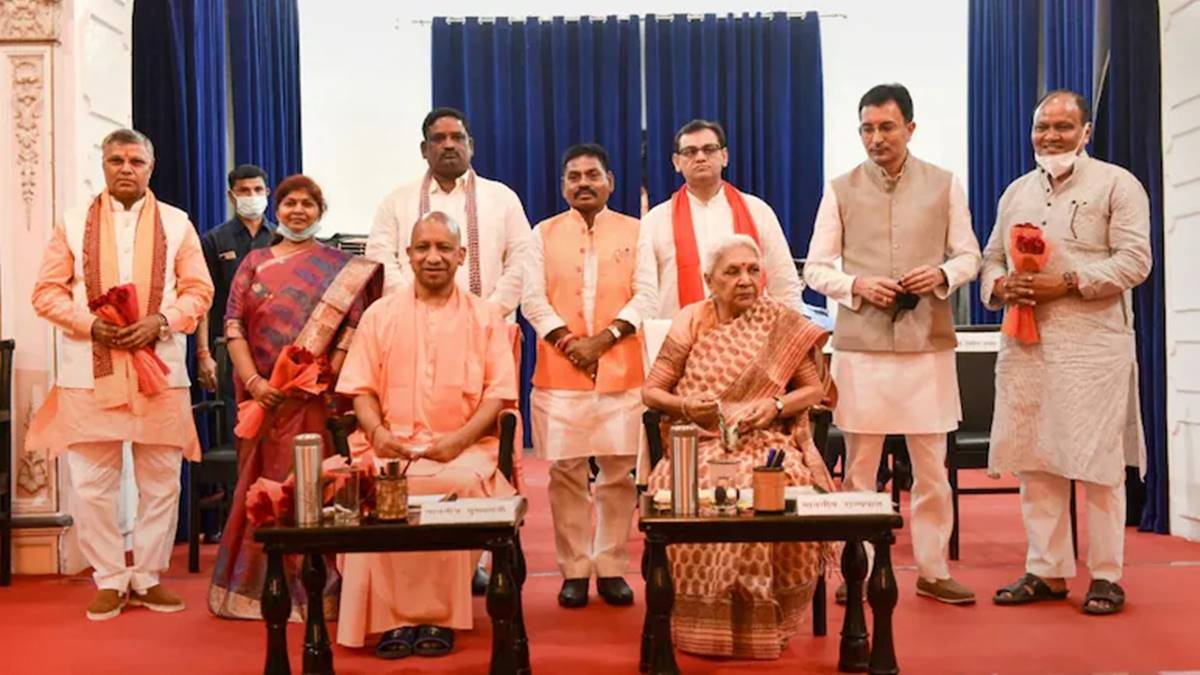The upcoming election holds significant importance, not merely due to the customary rhetoric often associated with elections, but rather because of the strategic manoeuvres being orchestrated by the Bharatiya Janata Party (BJP). The party’s approach towards the impending election, particularly in Uttar Pradesh, warrants close examination. Uttar Pradesh, with its ever-evolving political landscape, serves as the battleground for India’s coalition politics, given its association with Ayodhya and its 80 parliamentary seats. In today’s discussion, we delve into the BJP’s strategy in Uttar Pradesh and the recent cabinet expansion in the state, shedding light on its implications for the upcoming elections.
Recent reports indicate a significant expansion of the cabinet in Uttar Pradesh, with leaders from various political backgrounds being inducted as ministers. Notably, Sohel Dev from the Bharatiya Samaj Party and Om Prakash Rajbhar from the Bahujan Samaj Party (BSP) have been appointed as ministers. This expansion reflects BJP’s proactive approach to bolstering its political presence, even by incorporating individuals who were previously critical of the party. This move is indicative of BJP’s unwavering commitment to securing electoral victories through diverse means.
BJP’s political strategies extend beyond mere acquisition of MLAs or forming alliances to attain power. The party has demonstrated its determination to win elections, as evidenced by its actions in previous electoral contests. Whether it’s engineering defections, manipulating electoral processes, or leveraging its organizational prowess, BJP leaves no stone unturned in its quest for victory. The recent cabinet expansion in Uttar Pradesh serves as a testament to BJP’s astute political maneuvering, as it seeks to consolidate its position in the state ahead of the elections.

Furthermore, the involvement of leaders like Dara Singh Chauhan, who previously had affiliations with other political parties, underscores BJP’s inclusive approach towards coalition-building. By accommodating leaders from diverse backgrounds, BJP aims to ensure its electoral dominance across all segments of society. This strategy, orchestrated from Lucknow under the leadership of Chief Minister Yogi Adityanath, highlights BJP’s meticulous planning and execution in Uttar Pradesh.
However, the cabinet expansion has sparked debates among political commentators regarding its implications. While some view it as a strategic move to strengthen BJP’s electoral prospects, others speculate about its potential impact on Yogi Adityanath’s administration. Nonetheless, BJP’s resolve to secure victory in the upcoming elections remains unwavering, as it continues to navigate the complex political landscape of Uttar Pradesh with precision and foresight.
In the labyrinthine alleys of Lucknow, a new resolve is taking shape—a vow to withhold access to crucial files. It’s a striking declaration, particularly as it coincides with the recent appointment of ministers just days before the Code of Conduct takes effect. These newly anointed officials are set to be greeted with accolades, their ascension to the cabinet seen as a validation of community leadership. This narrative of justice and respect will undoubtedly be amplified in the lead-up to the 2024 elections. Securing a ministerial post becomes the ultimate prize, offering the BJP a strategic advantage as these figures are poised to rally their communities in support. The spectacle of the swearing-in ceremonies, complete with lavish displays and processions, will further reinforce the narrative that it was the BJP who bestowed this newfound respect upon them.
Even individuals like Dara Singh Chauhan, who faced defeat in their previous endeavours, have been elevated to ministerial positions. This move not only serves to fortify the BJP’s political position but also acts as a rebuttal to criticism levelled against their policies. The significance of these appointments extends beyond mere political manoeuvring; they underscore the BJP’s unwavering commitment to securing victory in the forthcoming Uttar Pradesh elections. It is evident that the BJP is leaving no stone unturned in its pursuit of electoral success, even if it means embracing erstwhile detractors into its fold.
The expansion of the cabinet in Uttar Pradesh is emblematic of the BJP’s pragmatic approach to governance and electoral strategy. By incorporating voices from diverse backgrounds, the BJP aims to consolidate its support base and mitigate potential challenges posed by opposition parties. The meticulous orchestration of these appointments, orchestrated not from Delhi but from Lucknow, underscores the depth of Yogi Adityanath’s involvement and the stakes involved in the upcoming electoral battle.
However, beneath the veneer of political expediency lies a more profound existential question for the BJP. Despite its formidable electoral machinery and the emotive appeal of issues such as the Ram temple, there are signs of vulnerability. The calculus of electoral arithmetic suggests that the BJP may have reached a saturation point in terms of expanding its voter base. As such, the party finds itself grappling with the spectre of anti-incumbency and the imperative to deliver on its promises.
The looming spectre of the 2024 elections has set the stage for a high-stakes political showdown in Uttar Pradesh. The BJP’s rivals, cognizant of the need to present a united front against the incumbent juggernaut, are exploring avenues for collaboration and coalition-building. Whether these efforts will yield tangible results remains to be seen. In the crucible of Uttar Pradesh politics, where alliances are forged and fortunes are made, the true test of political acumen and resilience lies ahead.


